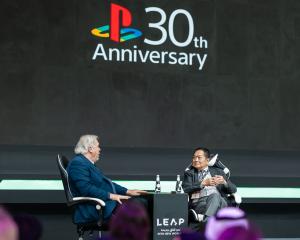
Further US$1.78 Billion in Tech Investments Announced at LEAP 2025 as Sports and Startups Take Centre Stage on Day Three
Equinix, the world’s largest data infrastructure company, led the way with an announcement on the LEAP 2025 main stage of a US$1bn investment to launch the region’s largest data centre in the Kingdom, with the firm promising it would lead to “job creation and more industries coming in”. Meanwhile, funds totalling more than US$695 million of investment to support startups, AI technologies, esports, and innovation solutions, were also announced.
Shining a halo on Saudi Arabia’s growing importance in Esports is a new venture, the HGM Fund. Following the establishment of its headquarters in the Kingdom, HGM announced the launch of a US$300 million fund to develop games in Saudi Arabia ready for local and international distribution. Louis Gresham, Partner – Gaming & Esports at HGM, revealed WILCO, the very first first-person shooter game to be made in the Kingdom, telling the audience the game will “take the world by storm,” when it is released in October this year.
The National Technology Development Program (NTDP) announced the launch of accelerators and financing funds worth US$150m to enhance the growth of technology companies in the Kingdom; Joa Capital launched an infrastructure fund of $80m in partnership with Buildnow Trading to address the construction sector's needs; while Ula Capital announced a first Saudi Arabian fund – worth US$75m – dedicated to investing in applied AI and deep tech ventures. Sharaka Financial also launched a US$30m fund to support the growth of startups in the MENA region, and Orbit Startups revealed a US$60m accelerator in partnership with Sanabil Investments to invest in 200 early-stage tech startups.
Elsewhere, leading tech companies announced the establishment of academies to build future-ready workforces by training 60,000 national talents in AI and advanced technologies. Microsoft launched the first Datacentre Academy in the region in partnership with NITA – a not-for-profit training academy – with a promise to export data, not oil, while Saudi Arabia’s Communications, Space & Technology Commission (CST) announced the completion of Cohort 2 and launch of Cohort 3 of its sandbox initiative, a platform for emerging technologies to enable innovators and startups to test, launch, and scale new tech solutions.
Michael Champion, CEO of Tahaluf, which co-organises LEAP with the Saudi Ministry for Communications and Information Technology (MCIT) and the Saudi Federation for Cybersecurity, Programming, and Drones (SAFCSP), noted LEAP’s ability to bring together so many different industries that may not be immediately identified as ‘technology’ and create meaningful discussions.
“The impact, insights, and investments we are seeing at LEAP 2025 across a diverse range of non-traditional tech sectors is truly remarkable,” he said. “We have heard from some of the leading global sports minds today, identifying, quite clearly, how technology is playing a key role in not only sports engagement at a fan level, but also at an industry level to increase growth, revenue, efficiency, and various other critical metrics .”
Etihad Salam Telecom Company (ESTC), a leading telecoms provider in the Kingdom, also entered into a strategic cooperation with ServiceNow, an AI Platform for digital transformation. Ahmed Al-Anqari, CEO of ESTC, said: “Salam’s presence at LEAP 2025 reinforces our commitment to the development of the digital economy and to actively contribute to Saudi Vision 2030. Here we have showcased a whole range of technologies that are human-inspired, yet business focused. We will continue to harness the power of technology and innovation to deliver purposeful solutions that benefit businesses, communities, and society at large while demonstrating our deep-rooted expertise in connectivity and security and emphasising our commitment to sustainability and SME empowerment.”
Saudi Arabia FIFA World Cup 2034 To Embrace Technology and Transform Kingdom
On the first day of LEAP’s inaugural Sports Tech track, Hammad Albalawi, Head of the Saudi Arabia FIFA World Cup 2034 bid unit, sat down with former France international and UEFA Champions League winner Patrice Evra to discuss the Kingdom’s plans for the historic global showpiece. Emphasising the importance of technology in Saudi’s broader vision for football development and societal transformation in the country, Albalawi said Saudi is ready to embrace change more than ever.
“I’m sure my daughter today knows more about what is possible in technology than we do,” said 34-year-old Albalawi. “But what you see in Saudi Arabia, especially here at LEAP, is a commitment to ensure that when the technology is available, we’re going to use it. Whatever becomes available to enhance the live viewing experience, to enhance the athletes’ performance, to enhance the seamless operation of the World Cup, you bet we will use it, and you bet we will make it the best experience.”
Noting that two-thirds of Saudi Arabia’s population were not born when Brazil won the FIFA World Cup in 1994, Albalawi highlighted how, 30 years on, the love and demand for football in the country has tripled, yet the growth in terms of pitches, stadiums, academies, and clubs has not. Noting significant growth in women's football within the country – three divisions, 20 clubs, and more than 90,000 females now playing the game nationwide – he said opportunities are enormous.
“LEAP is a great platform for people to really understand where these opportunities are,” said Albalawi on a day when sessions focused on everything from digital streaming and tech-driven revenue diversification to hydrogen racing, SailGP, and virtual reality (VR) boxing. “The World Cup is not the result – the World Cup is a milestone on a journey that we are continuously investing in. Whether it's in the men's game or the women's game, we look forward to fostering these partnerships, engagements, and friendships.”
On the LEAP main stage later in the day, Javier Tebas, President of Spain’s LaLiga – the world’s second most-watched football league – told delegates how AI can help football clubs both on and off the pitch. Acknowledging how AI is altering people’s lives and has become a tool “we cannot live without”, the head of Spanish football added the technology is “changing the history of sport”.
“We can see this revolution happening at a fast pace,” he said, citing that 85 percent of sports events are using AI. “AI and technology are helping our football clubs, our coaches, and our trainers improve efficiency.”
Tebas noted that while AI can help clubs tackle piracy and copyright challenges, with football a more global sport than ever before, there is a growing need for greater collaboration across countries. “Right now, there is content that is being published that is illegal,” he said. “We have to protect the copyright of our game, of our clubs. There needs to be more collaboration between clubs, with tech companies, with media channels. We see Saudi Arabia as a bridge to new technologies, to greater collaboration.”
Kutaragi Relates PlayStation History and Predicts AI Will See Gaming Grow Yet Further
Visiting the Kingdom for the first time and speaking on LEAP’s Gaming Stage, PlayStation creator Ken Kutaragi told how the games console came to be, the challenges he had to overcome, and what the future holds for gamers with how rapidly the gaming tech landscape is progressing.
“I joined Sony in 1975 and had a vision of what the gaming computer could be,” Kutaragi said. “It was only viewed as a toy back then and the hardware was very expensive. The PlayStation as we know it today was originally called WorkStation and people didn’t believe the name was going to be popular before we launched it. In fact, people said we were going to fail. Nobody believed we would be successful – even within Sony.”
Before PlayStation, arcade machines were being mass produced but it was not enough to create volume production advantages for chips and other components, according to Kutaragi. Sony’s approach instead was to take the industry and move it squarely into video games.
“I had a vision for something bigger, where consoles could lead to computer entertainment,” he said. “When we moved from cartridges to CD-ROMs and introduced the handheld controller, it completely transformed how quickly we could get the game units to market and into players’ hands.
“It is crazy to think that in 2024, software gaming revenues reached US$242 billion, eclipsing all other major entertainment categories, including digital music, box office, and television, which is the closest at US$134 billion. They say my predictions in the past have been pretty accurate, and I believe AI is going to help the industry grow even further than it already is.”
For more information on the event and ticket options, visit onegiantleap.com
Pragati Malik
MCS Action FZ LLC
+971 545315575
email us here
Distribution channels: Business & Economy, Companies, Conferences & Trade Fairs, IT Industry, Technology
Legal Disclaimer:
EIN Presswire provides this news content "as is" without warranty of any kind. We do not accept any responsibility or liability for the accuracy, content, images, videos, licenses, completeness, legality, or reliability of the information contained in this article. If you have any complaints or copyright issues related to this article, kindly contact the author above.
Submit your press release




